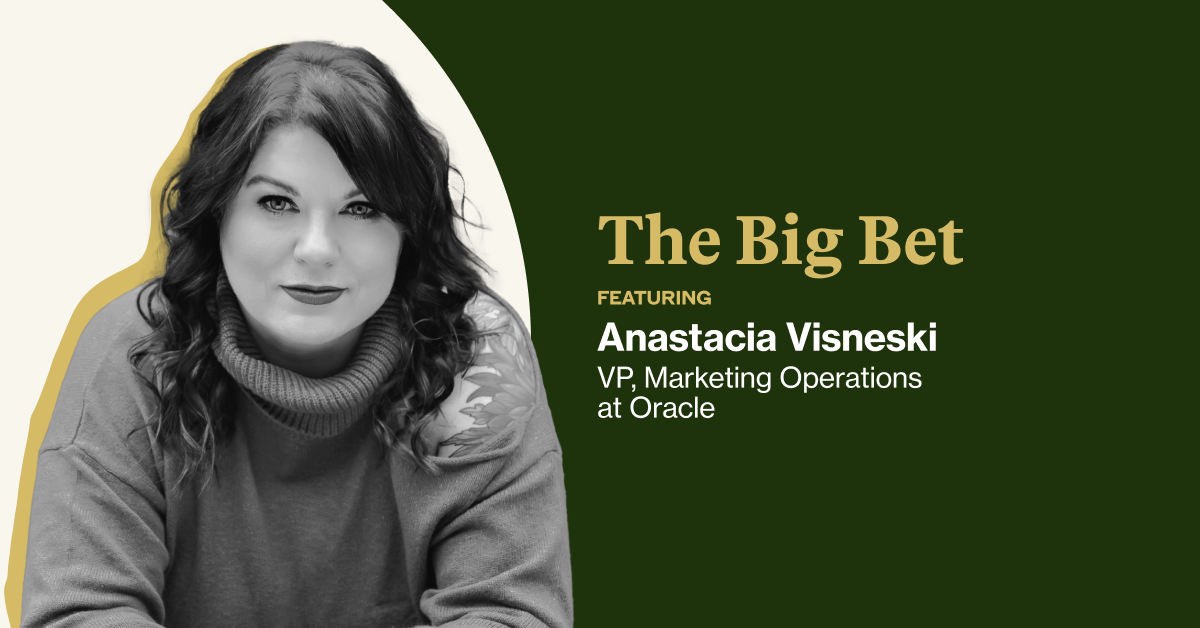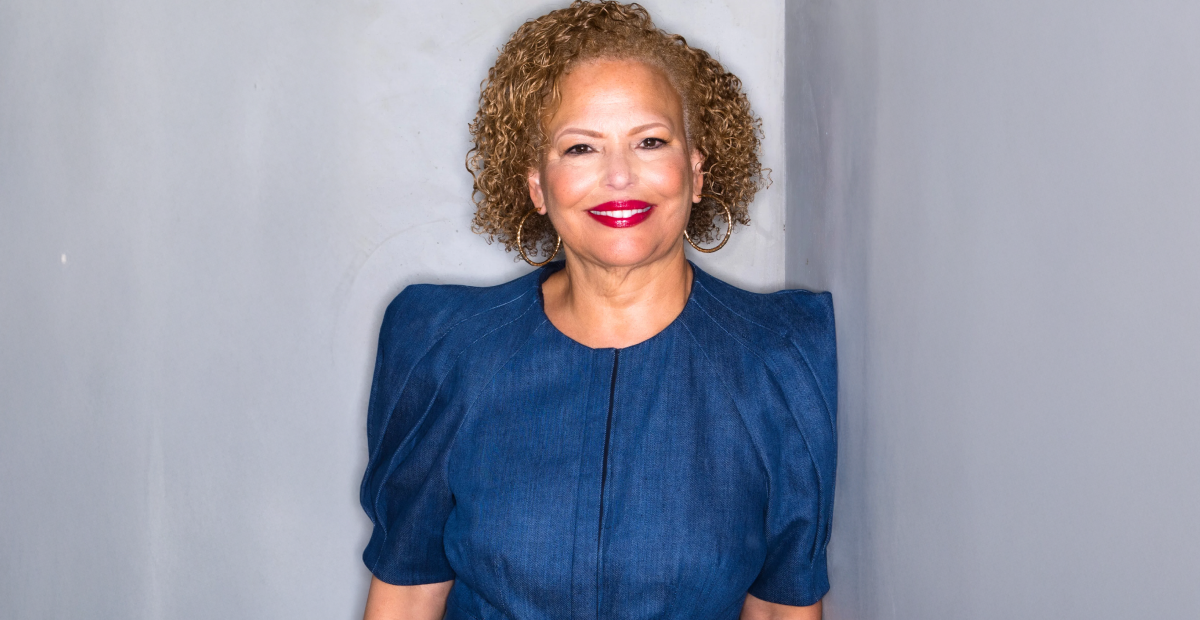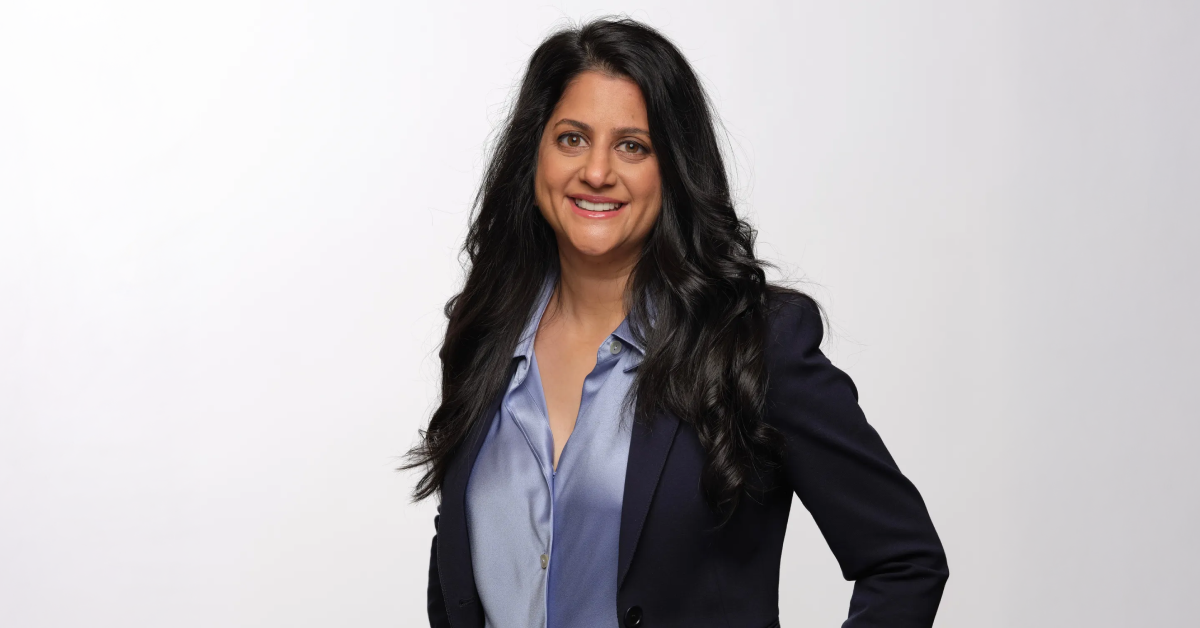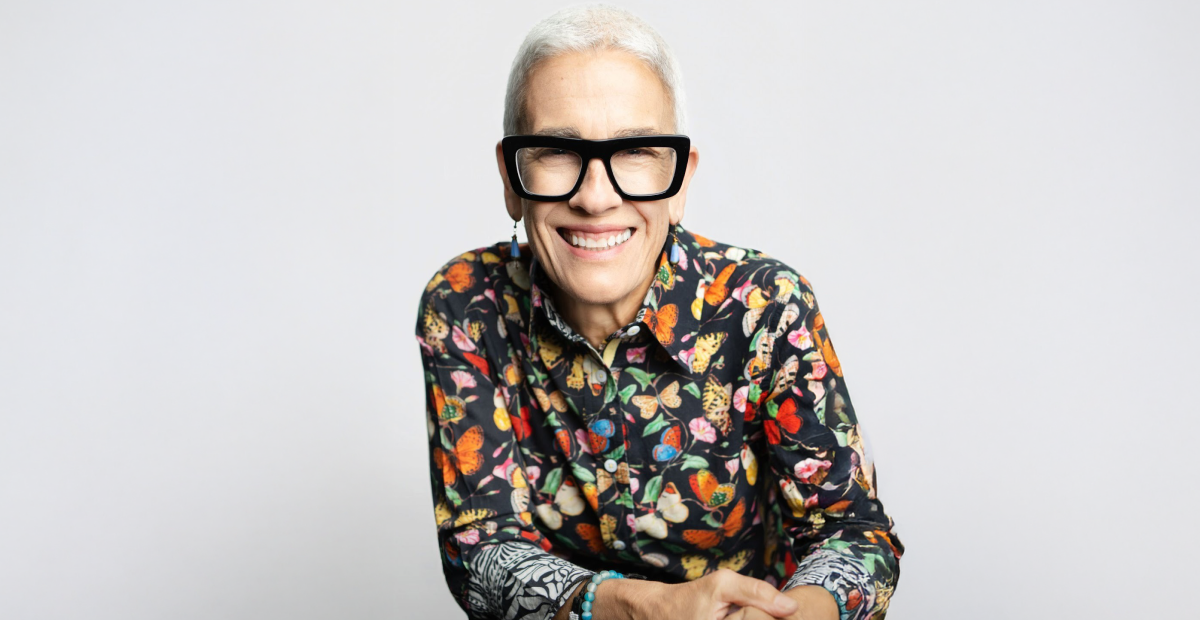The biggest career wins often come with risk. On our series, The Big Bet, Chief speaks with some of the most powerful members in our network about that single moment when they bet on themselves — and won.
When asked to sum up her career in one word, Chief Member Anastacia Visneski, who serves as the VP of Marketing Operations at Oracle, says without hesitation “chaotic.”
As a veteran who served in the U.S. Coast Guard for 12 years, Visneski’s journey into marketing and tech is far from typical. But after betting on herself early on, the VP soon learned that her love for social media, tech, and crisis management could take her far beyond the military.
In the first installment of The Big Bet, Visneski shares how burnout and a visit to the ER led her to quit her dream job at Amazon, and how her experience in the armed forces created both barriers and benefits on her journey to becoming an executive.
On Being a Third-Generation U.S. Coast Guard Member
“I joined the U.S. Coast Guard in 2004. I was third generation, following my father and my grandfather. I spent 12 years in the Coast Guard hilariously not doing anything anyone told me to do to have a career in the Coast Guard. Within the first few months of me being in, Hurricane Katrina happened and I was sent from my ship to New Orleans. That was my very first disaster response and I found a love for crisis communications, crisis management, and really being a responder and dealing with chaotic things.”
On Her Big Bet
“In 2006, shortly after I was about to leave my ship for the next tour of duty station, I was offered the District 8 Public Affairs Officer role in New Orleans. And I would say this is the first time I took a really big bet on myself and a really big leap that was completely contrary to what every one of my mentors told me to do. I was told that to keep a career in the Coast Guard I needed to stay on my ship and get my Cutterman's pin. But I had the opportunity to go and be the District Public Affairs Officer, the youngest ever selected for the role. I was going to be overseeing media relations for almost the entire Gulf Coast and then all the way up the Mississippi River.
“District 8 is physically one of the larger districts in the Coast Guard. And as you can imagine, in 2006, there were a lot of eyes on New Orleans and its recovery. So, I took that jump and I said, ‘Okay, you know what? I know everyone's saying that if I want to stay in the Coast Guard and make it to Captain or Admiral, I need to stay on the ship. But what I want to do, what feels right to do, and what will make me feel like I'm going on a grand adventure is to take this other role.’ So I did.”
On Managing Crises at Amazon
“I quickly realized that while I loved being in the Coast Guard, I did not like being a civilian in the government. While I was in grad school I made a connection with Jeff Barr, Chief Evangelist of Amazon Web Services, and he needed someone to run their blog. I had a lot of experience in blogging so I left DC in the summer of 2016 and joined AWS [in Seattle]. Originally, I was the Senior Program Manager for the AWS blog. But then in 2017, when they broke the internet due to S3 being down for like three hours, people were wondering what to do. And I said, ‘Well, why don't we use our crisis plan?’ And they're like, ‘Our what?’ So I ended up designing the critical event protocol for AWS Marketing. And I took that plan to Ariel Kelman, the VP of Marketing at the time, and he looked at me and went, ‘I think you should run it.’”
On Leaving Her Dream Job to Prioritize Self-Care
“I was very privileged to have been in a financial position that allowed me to leave the way I did. But, I will say that as someone who hates to quit and hates to admit any sort of weakness, it was incredibly hard. I was at the height of my success at AWS and it was a dream job. Leaving at that moment, I wouldn't say was taking a bet on myself. I would say that leaving at that moment was taking care of myself. My body was literally breaking down. I'd been in the ER because my blood pressure was through the roof and my heart was skipping beats. I just had to look at it and go, ‘This could be the peak of my career because who knows what’s going to happen with this pandemic.’ But at that moment I was like, ‘I cannot do this.’ And that was a big leap to acknowledge that self-care is important, especially when you come from the military because they teach you to power through everything.”
On the Bias Towards Veterans
“It's really frustrating because it is very hard to get people to understand what my skill set is, even when I lay it out for them. And there's a lot of bias too with all these companies talking about, ‘Oh, we hire veterans.’ One, the Coast Guard is usually left out of most veteran programs that companies have because even though it is one of the armed services, and it is the oldest seagoing service in the country, it's in the Department of Homeland Security (DHS) and not in the Department of Defense (DOD) so it usually gets left out.
“The other thing I've run into is people not willing to consider that my career didn't just start in 2016 when I got out. My career started in 2004 when I joined the Coast Guard. I have found that is a very common thing for veterans. We're even warned that when we get out, we should expect to get an entry-level job and that we should not expect to make the money we make. And for most of my peers, that has been true. I'm just super lucky to have gone to the grad school that I went to because it allowed me to do some networking with people who were in good positions like Jeff Barr.
“I do work with Oracle now [as the VP of Marketing Operations] where I hooked them up with the Coast Guard Foundation to make sure Coast Guard spouses and people getting out of the Coast Guard get the fellowship opportunities that the DOD folks get. But overall, it's been mostly frustrating and a little depressing.”
On What Scares Her
“I joke that I’ve made my ADHD my superpower because I'm always anxious. I'm always looking for, What am I going to do if something goes wrong? My dad used to joke, Plan every day of your career in the Coast Guard like you're going to break both legs and have to do something different the next day, and I took that to heart. So if Oracle has layoffs and I get caught, well I have a picture book coming out this November called, Oh Noes! A Picture Book for Execs — it's a crisis comms management book written in the style of a children's book. So I have that project to look forward to and I teach Crisis Comms at the University of Washington.
“But I would say honestly my biggest fear right now isn't even for me, it's for women in tech as a whole because as we see these layoffs happening, and as we see all this chaos, a lot of bad old habits are creeping up. I'm starting to see a lot of crunch come back into organizations. I'm starting to see a lot of the empathetic leadership start to get set to the side. And that scares me for the women coming up after me.”
On What Fuels Her
“I would say the women coming up behind me also fuel me. My team is mostly women, and the very first time I met one of them she was like, ‘I am so excited to see someone who looks like me,’ because I have rainbow colored hair and it was the summer so I had a short sleeve shirt on and you could see my tattoos. She was like, ‘I've never seen an exec who shows their tattoos or who has crazy colored hair or who uses words like yeet.’ So seeing them is a big part of what fuels me.
“But I would say, and I think a lot of us don't really want to admit this, but I would say spite also fuels me. And when I say that, I don't mean, ‘Oh, I'm going to spite this other person.’ I mean, ‘Oh, you want to tell me something can't be done that way? Alright, I'm going to do it anyway.’ I jokingly call this selective stubbornness. My selective stubbornness really fuels me because when I see something that needs to be fixed or something that's broken, I want to fix it, especially when people tell me it can't be done.”
On Labels
“Mine has been especially interesting because there's a leadership journey within the Coast Guard, which was one thing where I was battling both my gender and my last name in that people assumed I got a role because of who my dad was. So I've always had to be better than everyone else in the room. I’ve had to be the most knowledgeable. I’ve had to go in armed with as much data as possible. And then on the flip side there’s the outside world with the gender and veteran thing, which has had a really interesting intersection.
“There have been times where I think people assume I'm a hard a** and a stickler for the rules and I’m really organized because I'm a veteran. There are times that works to my benefit because if they looked at me as a woman, they'd think I was a b*tch. But because I'm a veteran, they blame that not my gender. So my background as a veteran has allowed me to be more forward and more blunt. Whereas someone who was looking at me as just a woman would've labeled me as aggressive. But because I'm a veteran, they label me as assertive.”
On Advice to Her Younger Self
“I would say that for all the mentors in the world that you have and all the people you look up to telling you what you should do, at the end of the day, the only person who has to live with that decision is you. And it is your decision to take an opportunity or not. It is your decision to walk away after your most successful event ever or not. Sometimes we get so pressured into doing what's expected or making you know the ‘Forbes 40 Under 40’ list, and thinking we need to be a superhero to be recognized. But you know what, at the end of the day you have to live with your decisions. And I can look back on my life and say that I've never made a career decision I regret. I've never made a decision that made me feel unethical or gross and I always did what I genuinely believed in.”
*Note: This interview has been edited and condensed for clarity.



